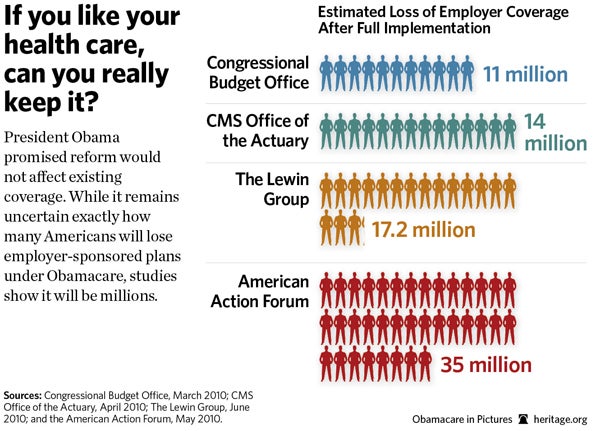Since Obamacare was enacted into law, different organizations have come out with different estimates of how many employers will drop health coverage for their employees. This week, the health care consulting firm Deloitte released a new survey that found that around 10 percent of employers would drop coverage and send their employees into the new government-run exchanges.
Although still ominous, Deloitte’s results significantly differ from previous studies by other organizations. Here are a few of the prominent examples:
- Congressional Budget Office (CBO). The CBO published an entire report dedicated to estimating the loss of employer-sponsored insurance (ESI). Attempting to model employer behavior, its low-end projection was that 5 million people will lose ESI. Under a different scenario, as many as 20 million fewer Americans could have ESI by 2019.
- McKinsey and Company. McKinsey, another consulting firm, found that “30 percent of employers will definitely or probably stop offering ESI in the years after 2014.”
- American Action Forum. Douglas Holtz-Eakin, former CBO director and president of the American Action Forum, estimated that Obamacare “provides strong incentives for employers—with the agreement of their employees—to drop employer-sponsored health insurance for as many as 35 million Americans.”
While these results may vary in severity, they all mean that, to some degree, Obamacare will cause Americans to lose their current health care coverage.
The reason employers will drop coverage under Obamacare but didn’t before is that Obamacare creates a place for employees to get coverage outside of the employer. McKinsey explains the change:
[Obamacare] reduces the social-equity advantage of employer-sponsored insurance, by enabling these workers to obtain coverage they could not afford on today’s individual market. It also significantly increases the availability of substitutes for employer coverage. As a result, whether to offer [coverage] after 2014 becomes mostly a business decision. Employers will have to balance the need to remain attractive to talented workers with the net economics of providing benefits—taking into consideration all the penalties and tax advantages of offering or not offering any given level of coverage.
However, this unintended consequence isn’t frowned upon by the pushers of Obamacare. When asked about the results of the McKinsey study, House minority leader and Obamacare advocate Nancy Pelosi (D–CA) said that “the way we see it is an innovative prevention-oriented way for businesses to be emancipated from health care costs because they have a way out or whatever works for them.”
Providing incentives for employers to dump their employees into the exchanges is simply shifting the cost burden to taxpayers. As more people enter the government-subsidized exchanges, the higher costs will be paid for with more tax dollars.
Whatever the employer-dumping study du jour says, it’s not good for Americans who want to keep their employer-sponsored coverage in the new Obamacare era.



























